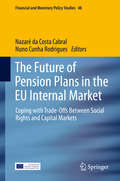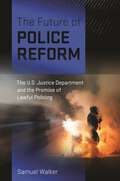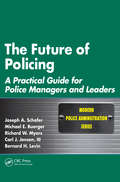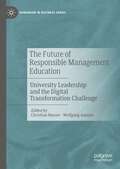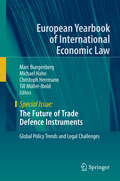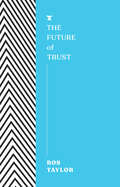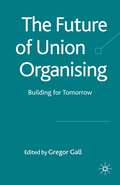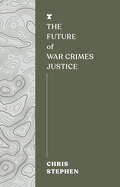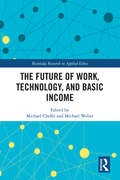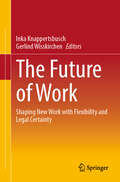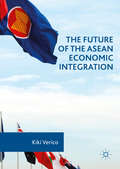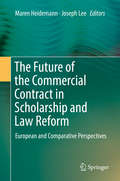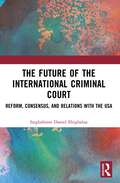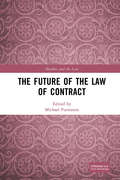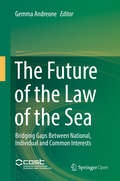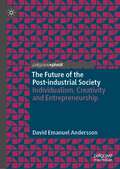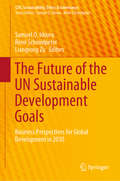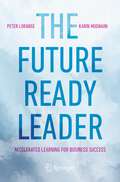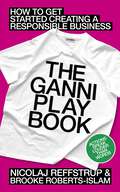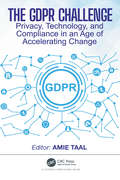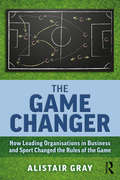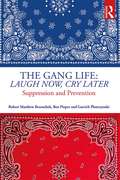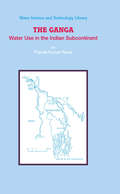- Table View
- List View
The Future of Pension Plans in the EU Internal Market: Coping with Trade-Offs Between Social Rights and Capital Markets (Financial and Monetary Policy Studies #48)
by Nazaré da Costa Cabral Nuno Cunha RodriguesThis edited volume takes a closer look at various European pension-plan models and the recent challenges, trends and predictions related to the design of such schemes. The contributors analyse new ideas, both from national governments and European institutions, and consider current debates on topics such as the Capital Markets Union (CMU) and the so-called ‘European Pillar of Social Rights’ – calling for a new approach to social policy at the European level in response to common challenges, such as ageing and the digital revolution.This interdisciplinary work embraces economic, financial and legal perspectives, while focusing on previously selected coherence aspects in order to ensure that the analyses are comprehensive and globally consistent.
The Future of Police Reform: The U.S. Justice Department and the Promise of Lawful Policing
by Samuel WalkerThe first thorough study of the Justice Department’s pattern or practice program, examining how it works and how court-imposed consent decrees implement needed reformsAmerican society grapples with an enduring crisis in policing which is inextricably intertwined with the nation’s deeply rooted racial issues. While there have been great strides in policing over the past five decades, the United States continues to wrestle with serious crime and strained relations between law enforcement and African American communities.In this comprehensive analysis, Samuel Walker, a leading figure in the study of criminal justice, focuses on the pivotal federal effort behind police reform—the US Justice Department’s pattern or practice program. Created by Congress in 1994, this program gives the Justice Department the authority to investigate police departments that display patterns of unconstitutional practices, initiate civil suits, and secure court-enforced consent decrees that mandate reform. Walker meticulously examines the reforms dictated by these consent decrees, delves into the challenges of their implementation, and evaluates the progress made by various departments in enhancing police services. Despite various obstacles, the program has proven successful.The Future of Police Reform also considers the broader societal, political, and legal issues that profoundly influence reform efforts, such as an entrenched police subculture hindering change, the formidable power of police unions, and a lack of full support from local political leaders.In conclusion, Walker celebrates reform efforts across the country and foresees a network of local and state centers of activity fostering continued optimism for the future of police reform in the US. A collective effort holds the promise of genuine and lasting change.
The Future of Policing: A Practical Guide for Police Managers and Leaders (Modern Police Administration)
by Michael E. Buerger Carl J. Jensen III Joseph A. Schafer Richard W. Myers Bernard H. LevinAs communities continue to undergo rapid demographic shifts that modify their composition, culture, and collective values, police departments serving those communities must evolve accordingly in order to remain effective. The Future of Policing: A Practical Guide for Police Managers and Leaders provides concrete instruction to agencies on how to pr
The Future of Responsible Management Education: University Leadership and the Digital Transformation Challenge (Humanism in Business Series)
by Wolfgang Amann Christian HauserBusiness schools have been criticized for several things, such as lacking relevance, a too weak ethics orientation, dated paradigms, or commercialization. Simultaneously, there has been much positive change and accelerated dynamics toward forming future-ready companies and graduates. This book outlines how to better understand and master the digital transformation challenge. It is essential that business school deans, program directors, and faculty members embrace new opportunities to bring the UN-backed Principles of Responsible Management Education (PRME) to life successfully.Part of the Humanism in Business series, this book constitutes a valuable resource for leaders in universities and business schools, as well as individual faculty members aspiring to optimize how they respond to digital transformation. It can also be of use to those studying responsible management education, leadership and business ethics more generally.
The Future of Trade Defence Instruments: Global Policy Trends And Legal Challenges (European Yearbook of International Economic Law)
by Christoph Herrmann Marc Bungenberg Michael Hahn Till Müller-IboldThis EYIEL Special Issue is devoted to the European Union’s Trade Defence Instruments (TDIs). The recent legislative changes at the EU level are indicative of global policy trends and legal challenges surrounding trade remedies law. Although TDI measures have always been a fiercely debated topic in international economic law, they have received increased attention in recent years. This book offers a comprehensive and insightful legal analysis of the recent legislative changes at the EU level and investigates TDIs in the context of regional trade relationships, including the United Kingdom in post-Brexit times. Beyond the EU, it examines the national trade defence law frameworks of important trading partners such as Switzerland, the United States, China and Vietnam.The selected contributions in this edited volume examine the recent trends in trade defence law from a legal and practical perspective and offer analytical insights from EU officials, legal practitioners and leading academics. A unique collection of essays in a changed global framework, this EYIEL Special Issue provides an up-to-date overview of the state of play of trade defence in the EU and around the globe.
The Future of Trust
by Ros TaylorA revealing exploration into how trust defines our lives, how it can be won and lost, and what its future might look like, in this fascinating title in the Melville House's FUTURES series.In a society battered by economic, political, cultural and ecological collapse, where do we place our trust, now that it is more vital than ever for our survival? How has that trust – in our laws, our media, our governments – been lost, and how can it be won back? Examining the police, the rule of law, artificial intelligence, the 21st century city and social media, Ros Taylor imagines what life might be like in years to come if trust continues to erode.Have conspiracy theories permanently damaged our society? Will technological advances, which require more and more of our human selves, ultimately be rejected by future generations? And in a world fast approaching irreversible levels of ecological damage, how can we trust the custodians of these institutions to do the right thing – even as humanity faces catastrophe?
The Future of Union Organising
by Gregor GallWhile 'union organising' has developed over time and in many different environments, it has become apparent that a number of key problems have developed. Evaluating its efficacy in terms of union strategies, tactics, styles and resources, this title outlines a number of strategies for improving these deficiences.
The Future of War Crimes Justice
by Chris StephenFrom Russia to The Democratic Republic of Congo to Myanmar, Chris Stephen ponders the future of prosecuting war criminals who think themselves untouchable in this timely new book, part of Melville House FUTURES series.We are all too familiar with the horrors of war. Throughout history, rules have been laid down to govern the conduct of war, with varying success. Today, the International Criminal Court (ICC) in the Netherlands is the world's first permanent war crimes court, but since it opened in 2002, it has jailed just 4 people. So what has gone wrong?Journalist and ex war-correspondent Chris Stephen takes a look at the colorful history of how war law was devised, asking complicated and important questions such as: What constitutes a war crime? How and when can the law step into prosecute? Today, membership of the ICC is voluntary. Of the UN&’s 193 member states, 123 are in the ICC. But most of the world&’s war crimes are committed by the other 70. Simply put, governments that commit war crimes don&’t join the ICC – like Russia, for example.How then, do we go after war criminals? Follow the money, argues Stephen, and go after the banks and corporations that enable warlords. It worked for Al Capone, who, famously, was jailed not for his many killings, but for not paying his taxes. It was the same for Milosevic: years were spent gathering records, so judges could be shown he pulled the financial strings.Corporations and banks, span the world. Democracies and dictators both rely on them. The future of war crime courts demand they hit all the enablers, whether they wear battle fatigues or three-piece suits.
The Future of Work, Technology, and Basic Income (Routledge Research in Applied Ethics)
by Michael Weber Michael CholbiTechnological advances in computerization and robotics threaten to eliminate countless jobs from the labor market in the near future. These advances have reignited the debate about universal basic income. The essays in this collection offer unique and compelling perspectives on the ever-changing nature of work and the plausibility of a universal basic income to address the elimination of jobs from the workforce. The essays address a number of topics related to these issues, including the prospects of libertarian and anarchist justifications for a universal basic income, the positive impact of a basic income on intimate laborers such as sex workers and surrogates, the nature of "bad work" and who will do it if everyone receives a basic income, whether a universal basic income is objectionably paternalistic, and viable alternatives to a universal basic income. This book raises complex questions and avenues for future research about universal basic income and the future of work in our increasingly technological society. It will be of keen interest to graduate students and scholars in political philosophy, economics, political science, and public policy who are interested in these debates.
The Future of Work: Shaping New Work with Flexibility and Legal Certainty
by Gerlind Wisskirchen Inka KnappertsbuschThis book takes readers on a journey into the future of work. Following the influence of the COVID-19 pandemic, working conditions have become more flexible than ever before. The freedoms granted within this framework continue to be demanded by many employees. There are also numerous companies that have had predominantly positive experiences with this change and would like to continue with it. Against this backdrop, it is to be expected that the shift away from a traditional working environment – due to the four influencing factors of demographic change, skills shortages, digitalisation and artificial intelligence – will accelerate in the future. This book provides an overview of the various design options for New Work and highlights their respective advantages and disadvantages. It also analyses new trends and forecasts relating to the future of work. In addition, the relevant legal framework is presented in a concise and easy-to-understand manner. This book provides you with the tools you need to actively shape the future of work in your company in a legally compliant manner. The editors Dr. Inka Knappertsbusch is a lawyer specializing in employment law and employee data protection at the international commercial law firm CMS Germany. She advises companies primarily on restructuring and works agreements, in particular on issues related to IT and new work. Her work also focuses on data protection and artificial intelligence in employment relationships. She is the co-editor of the book "Arbeitswelt und KI 2030". Dr. Gerlind Wisskirchen is a partner and lawyer at the international commercial law firm CMS Germany and advises multinational corporations in particular on restructuring, national and international employment law and compliance issues. She is also an expert on the digitalisation of the world of work, with experience as a keynote speaker, author and lecturer and is the editor of the report "Artificial Intelligence and Robotics and Their Impact on the Workplace" for the Global Employment Institute. The translation was done with the help of artificial intelligence. A subsequent human revision was done primarily in terms of content.
The Future of the ASEAN Economic Integration
by Kiki VericoVerico discusses the ASEAN economic integration from dual perspectives of time span (trade, investment and finance) and framework (bilateral, sub-regional, regional and regional plus). The work is a comprehensive study of the integration in the wake of the ASEAN Economic Community (AEC)’s inauguration in late 2015. Examining various economic agreement levels from the ASEAN Free Trade Area (AFTA), Bilateral Free Trade Agreement (BFTA) and the AEC to financial integration in ASEAN, Verico attempts to envisage the future of ASEAN in completing its regional economic integration from trade to investment and finance. Verico argues that, in the absence of a customs union, ASEAN must utilize the open-regionalism frameworks of the ASEAN Plus One, ASEAN Plus Three, Regional Comprehensive Economic Partnership and others in order to shift its economic integration level in this way.
The Future of the Commercial Contract in Scholarship and Law Reform: European And Comparative Perspectives
by Maren Heidemann Joseph LeeThis book explores commercial contract law in scholarship and legal practice, suggests new research agendas and provides a forum for debate of typical issues that might benefit from further attention by scholarship and legislatures. The authors from over ten different jurisdictions take an international and comparative approach. Not confined to EU law it re-opens the debate internationally and seeks to reclaim the wider meaning of European law as rooted in geography and cultural legal heritage. There is a need to focus on commercial contracts in more detail in research and legislation. The transactional approach, the role of recent law reform, including the new French Civil Code, cross-border dealings, substantive contract law in public international law and ICSID arbitration as well as current contractual practices like OEM, CSR, contractual co-operation, sustainability and intra-corporate arbitration contribute to a wider regulatory outlook for commercial transactions.
The Future of the International Criminal Court: Reform, Consensus, and Relations with the USA
by Iseghohime Daniel EhighaluaThis book presents the argument that solution-driven policy and treaty changes, if faithfully implemented, will rekindle the relevance of the International Criminal Court (ICC) in combatting and prosecuting atrocity crimes. This work examines how the International Criminal Court could be re-envisioned to perform optimally, and why such reform is urgent. It also discusses the position of the USA towards the court and explores why it has been unable to transition from marginal engagement to full spectrum support by signing and ratifying the Rome Treaty 1998. The conceptual frameworks deployed range from how the US construes its ‘national interest’ to geo-political balancing and the present rudderless state of the rules order, in addition to the personal predilections of US Presidents and the Court’s dysfunctional state. The objective is to show that if the ICC does not engender reforms internally, it will not survive the fissiparous tendencies innate in the presently fractured rules order. The work argues that only foundational reforms around treaty amendments along with institutional realignment of roles and responsibilities of the Court’s principal officers will yet rescue it. The book will be of interest to researchers, academics and policy-makers working in the areas of International Criminal Law and International Relations.
The Future of the Law of Contract (Markets and the Law)
by Michael FurmstonThe Future of the Law of Contract brings together an impressive collection of essays on contract law. Taking a comparative approach, the aim of the book is to address how the law of contract will develop over the next 25 years, as well as considering the ways in which changes to the way that contracts are made will affect the law. Topics include good faith; objectivity; exclusion clauses; economic duress; variation of contract; contract and privacy law in a digital environment; technological change; Choice of Court Agreements; and Islamic finance contracts. The chapters are written by leading academics from England, Australia, Canada, the United States, Singapore and Malaysia. As such, this collection will be of global interest and importance to professionals, academics and students of contract law.
The Future of the Law of the Sea
by Gemma AndreoneThis book is open access under a CC BY-NC 4. 9 license. It explores the diverse phenomena which are challenging the international law of the sea today, using the unique perspective of a simultaneous analysis of the national, individual and common interests at stake. This perspective, which all the contributors bear in mind when treating their own topic, also constitutes a useful element in the effort to bring today's legal complexity and fragmentation to a homogenous vision of the sustainable use of the marine environment and of its resources, and also of the international and national response to maritime crimes. The volume analyzes the relevant legal frameworks and recent developments, focusing on the competing interests which have influenced State jurisdiction and other regulatory processes. An analysis of the competing interests and their developments allows us to identify actors and relevant legal and institutional contexts, retracing how and when these elements have changed over time.
The Future of the Post-industrial Society: Individualism, Creativity and Entrepreneurship (Palgrave Studies in Classical Liberalism)
by David Emanuel AnderssonThis book studies the ongoing transition from an industrial to a creative (or post-industrial) society and how the creative society depends on a ‘soft infrastructure’ of individualist values and institutions. It explains this by looking first at the key actors in the creative society: creative individuals and entrepreneurial individuals, using insights from social and cognitive psychology and the economic theory of entrepreneurship. It shows how individual creativity and entrepreneurship are supported by both cultural individualism, based on the work of political scientists Ronald Inglehart and Christian Welzel, as well as political individualism, the principles of a democratic market economy guided by classical liberalism. The book offers a number of policy implications that result from the connection of this multidisciplinary reconceptualization of individualism to economic creativity. It discusses a system of property rights that accommodates the creation of new property, ranging from the result of what we normally think of as product innovation to larger-scale innovations embodied in the formation of new lifestyle communities. It also considers examples such as universities that are more open to experimentation and more autonomous from government regulation, and a more liberal immigration policy that may result from the positive association between population diversity and creativity. This book is intended to support further interdisciplinary and multidisciplinary research on the creative society (also known as post-industrialism, the postmodern society or the knowledge-based society). It will be of interest to academics and postgraduate students working in political economy, entrepreneurship, institutional economics, Austrian economics, and public policy.
The Future of the UN Sustainable Development Goals: Business Perspectives for Global Development in 2030 (CSR, Sustainability, Ethics & Governance)
by Samuel O. Idowu René Schmidpeter Liangrong ZuThis book provides a business-oriented analysis of the United Nations (UN) Sustainable Development Goals (SDG). In order to assess their impact on businesses and corporations, the book addresses all 17 goals and a broad range of industries. Gathering contributions from Africa, Europe and Asia, it presents both critical reviews and case studies. In turn, the book seeks to predict likely developments during the next decade. To do so, it examines evidence from today’s business world and how companies and corporations have been adopting the SDGs since their release. In this regard, it discusses the changes that will be required and how the agenda will affect the continent’s development path. An underlying theme throughout the book is the role of monetary value and investment for sustainable development: whether through financing, enhanced turnaround resulting from a more educated population, or more socially innovative entrepreneurs.
The Future-Ready Leader: Accelerated Learning for Business Success
by Peter Lorange Karin MugnainiIf you're a business leader looking to stay ahead of the curve, this book is an essential guide. It offers a comprehensive overview of the major trends shaping the future of business, drawing on reviews of 70 recent management books and interviews with 21 senior leaders.What sets this book apart is that it's grounded in the real-world experiences of active business leaders. From political affairs to family businesses and everything in between, each of the eight parts offers expert insights on the challenges and opportunities that lie ahead. Whether you're seeking to adapt your strategy to the external environment, lead your organization towards fulfilling its mission, or simply stay ahead of the competition, this book has got you covered.
The GANNI Playbook: How to Get Started Creating a Responsible Business
by Nicolaj Reffstrup Brooke Roberts-Islam'It’s Ganni’s journey from cult Scandi favourite to a leader in the sustainability space'Emily Chan, VogueThis book is about what happened when a business leader decided not to bury his head in the sand about climate change; when he found the conversation with his kids about floods from melting ice caps too painful. This book asks what it means to force yourself to take a different business path, where the destination is a responsible and profit-making business.In The GANNI Playbook, Nicolaj Reffstrup unveils the strategies that propelled GANNI to international stardom, while candidly unravelling the cultural, operational and creative components required to construct a business that embraces an uncertain future.'GANNI offers a blueprint for how to embed sustainability from within'Rachel Cernansky, Vogue Business'What's the secret to sustainable success? There is no secret. GANNI is willing to share. In fact, it’s doing exactly that'Rose Dodd, Sleek
The GCC Banking Sector: Topography and Analysis
by Abdullah Al-Hassan May Khamis Nada OulidiA report from the International Monetary Fund.
The GDPR Challenge: Privacy, Technology, and Compliance in an Age of Accelerating Change
by Amie TaalConsent is necessary for collecting, processing and transferring Personal Identifiable Information (PII) and sensitive personal data. But to what extent? What are the limitations and restricts to avoid penalties under The General Data Protection Regulation 2018 (GDPR) rules, which may be up to 4% of annual global turnover or €20 million (whichever is higher), enforcements and sanctions? Under GDPR Article 51, each EU Member State shall maintain an independent public authority to be responsible for monitoring the application of this regulation to protect the fundamental rights of data subjects (Supervisory Authority). The Supervisory Authority has powers to issue warnings, conduct audits, recommend remediation, order erasure of data and suspend data transfers to a third country.GDPR has changed the way data is used, accessed and stored. It's reach extends well beyond the European Union and is the basis of other data privacy laws around the world.This book provides a review and guidance on implementing and compliance of GDPR while taking advantage of technology innovations and supported by real-life examples. The book shows the wide scope of applications to protect data privacy while taking advantage of processes and techniques in various fields such as eDiscovery, Cyber Insurance, Virtual-based Intelligence, Information Security, Cyber Security, Information Governance, Blockchain and Biometric technologies and techniques.
The Gacaca Courts, Post-Genocide Justice and Reconciliation in Rwanda
by Phil ClarkSince 2001, the Gacaca community courts have been the centrepiece of Rwanda's justice and reconciliation programme. Nearly every adult Rwandan has participated in the trials, principally by providing eyewitness testimony concerning genocide crimes. Lawyers are banned from any official involvement, an issue that has generated sustained criticism from human rights organisations and international scepticism regarding Gacaca's efficacy. Drawing on more than six years of fieldwork in Rwanda and nearly five hundred interviews with participants in trials, this in-depth ethnographic investigation of a complex transitional justice institution explores the ways in which Rwandans interpret Gacaca. Its conclusions provide indispensable insight into post-genocide justice and reconciliation, as well as the population's views on the future of Rwanda itself.
The Game Changer: How Leading Organisations in Business and Sport Changed the Rules of the Game
by Alistair GrayThe Game Changer powerfully demonstrates how some organisations in business and sport have done more than raise their performance; they have also changed the rules of the game or the game itself within their industry. It gives examples of the strategies and governance programmes that have emerged to accomplish this, and the challenges of executing them. This book brings to life strategic management in business, sport and not-for-profit organisations. It explores many of the theories taught on MBA and other professional programmes through case studies from the worlds of sport and business, written by authors who have played a part in the change. Alistair Gray has spent much of his career in senior roles in these sectors and brings a unique insight to the field, as well as providing the reader with tools and techniques for improvement in governance and performance. The Game Changer is essential reading for both professionals looking for methods to improve their own performance and to embed strong principles of governance, and business students looking for real-life lessons from practice.
The Gang Life: Suppression and Prevention
by Robert Matthew Brzenchek Ben Pieper Garrick PlonczynskiThe Gang Life: Laugh Now, Cry Later examines the criminal gangster mindset and offers gang prevention strategies, using real-world examples to demonstrate a holistic approach toward combatting this surging societal problem. The text outlines the evolution of gang membership from a state of interest, to association, to hardcore "O.G." (Original Gangster) status, and explores the evolution of law enforcement’s multi-pronged approach to combating criminal street gang violence, from the catch-and-release mentality of the 1970s and 1980s to today’s collaboration with private organizations such as Boys & Girls Clubs. In-depth profiles, case studies, and lengthy histories of gangs, gang members, and their transformations are provided to demonstrate the deleterious effect of gangs on society. Designed for criminal justice students and for practitioners in the field, this text offers readers a holistic approach toward gang prevention from three nationally awarded educators and gang investigators.
The Ganga
by Pranab Kumar ParuaThe geo-hydro-morphometry of the river Ganges has a history of long and wide variations as the river is continuously fed by the high Himalayas hill ranges, the highest in the world. The river is categorized as an international one, passing through several independent countries. The major flow of the river used to flow through the branch river, Bhagirathi-Hooghly on the banks of which both city and port of Calcutta (now renamed Kolkata) are situated. However, due to massive tectonic and morphological changes, the flow through the branch river has gradually decreased resulting in enormous damages to the port and the city. After more than a century of investigations on the probable causes of deterioration and its remedies, a barrage across the river had been constructed near a place called Farakka in the Murshidabad district of West Bengal, India for diversion of a part of lean season flow (40,000 cu secs) from the parent river to the branch river for the resuscitation of the branch river and revitalization of the port of Calcutta. The turmoil started since the construction of barrage between 1965-1975 and the major neighbouring countries, India and Bangladesh, were locked in the dispute over sharing the water of the parent river. After several rounds of discussions at different levels between the two countries, short-term agreements were signed two times, one in 1977 and the other in 1985, and finally one long term Treaty was signed in 1996 between the two countries in an atmosphere of peaceful co-existence. Audience: The book will be of interest to researchers and scientists, professionals and policymakers in water resources management and environmental science, conservation policy and development research.
